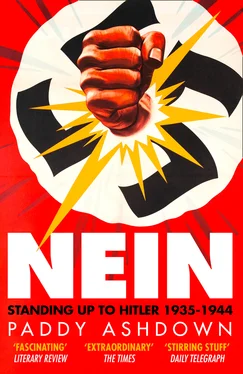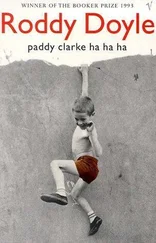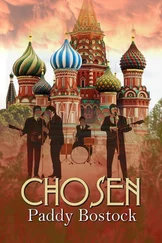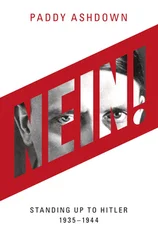Dietrich Bonhoeffer – himself one of those murdered for his role in the anti-Hitler resistance – said: ‘Responsible action takes place in the sphere of relativity, completely shrouded in the twilight that the historical situation casts upon good and evil. It takes place in the midst of the countless perspectives from which every phenomenon is seen. Responsible action must decide not just between right and wrong, but between right and right and wrong and wrong.’
So it is, exactly, here. There are no blacks and whites, just choices between blacker blacks and whiter whites. There are no triumphal personal qualities, and no triumphant outcomes. Just flawed individuals who, at a time of what Bonhoeffer referred to as ‘moral twilight’, felt compelled to do the right thing as they saw it. That is a lesser triumph than we might wish for in dangerous times, but it was then – and is now – probably the only triumph we can reasonably expect.
This story is, at its heart, a tragedy. Like all great tragedies it involves personal flaws, the misjudgements of the mighty, and a malevolent fate. There is individual pity and suffering, and a deal of personal stupidity, here.
But – and herein lies the history – since these were human beings of consequence, their personal decisions affected lives and events far beyond their circle and their time.
The two central historical questions posed by this book are stark: did the Second World War have to happen? And if it did, did it have to end with a peace which enslaved Eastern Europe?
My purpose is not to provide definitive answers, but rather to present some facts which are not generally known – or at least not taken account of – and place these against the conventional view of the origins, progress and outcomes of World War II.
In reading this book you may be struck, as I was in writing it, by the similarities between what happened in the build-up to World War II and the age in which we now live. Then as now, nationalism and protectionism were on the rise, and democracies were seen to have failed; people hungered for the government of strong men; those who suffered most from the pain of economic collapse felt alienated and turned towards simplistic solutions and strident voices; public institutions, conventional politics and the old establishments were everywhere mistrusted and disbelieved; compromise was out of fashion; the centre collapsed in favour of the extremes; the normal order of things didn’t function; change – even revolution – was more appealing than the status quo, and ‘fake news’ built around the convincing untruth carried more weight in the public discourse than rational arguments and provable facts.
Painting a lie on the side of a bus and driving it around the country would have seemed perfectly normal in those days.
Nevertheless, I have found myself inspired in writing this story. It has proved to me that, even in such terrible times, there were some who were prepared to stand up against the age, even when their cause was hopeless, and even at the cost of their lives.
I hope that you will find that inspiration here, too.
Anulow, Leonid Abramovitsch – Alias ‘Kolja’ – Soviet ‘Rezident’ in Switzerland before Radó
Attolico, Bernardo – Italian ambassador in Berlin
Bartik, Major Josef – Head of Czech intelligence 1938
Beck, General Ludwig – Chief of staff of the German army until dismissed by Hitler in 1938. The army leader of the anti-Hitler plot
Bell, George – Anglican theologian and bishop of Chichester
Beneš, Edvard – Czech president 1935–38
Beurton, Leon Charles – Known as Len. Friend of Alexander Foote. Radio operator Dora Ring
Bihet-Richou, Madeleine – Lover of Erwin Lahousen. French secret services
Blomberg, Field Marshal Werner von – Commander-in-chief of the German army until dismissed by Hitler in 1938
Bock, Field Marshal Fedor von – Von Tresckow’s uncle. Commander of Army Group Centre
Bolli, Margrit – Alias ‘Rosy’. Rote Drei radio operator
Bonhoeffer, Dietrich – Theologian, German pastor and key plotter
Bonhoeffer, Dr Karl – Father of Dietrich. Took part in the September 1938 plot
Bosch, Robert – German industrialist. Founder of the Bosch industrial empire. Supporter of Goerdeler
Brauchitsch, Field Marshal Walther von – Commander-in-chief of the German army up to the defeat at Moscow in 1941
Cadogan, Sir Alexander – Head of the British Foreign Office
Canaris, Erika – Wife of Wilhelm
Canaris, Wilhelm – Head of the German Abwehr until his dismissal in 1944
Chojnacki, Captain Sczcęsny – Polish intelligence spy-master based in Switzerland
Ciano, Galeazzo – Italian foreign minister
Colvin, Ian – Central European correspondent of the London News Chronicle . Arranged von Kleist-Schmenzin’s visit to Britain in 1938
Daladier, Édouard – French prime minister
Dansey, Sir Claude – Deputy head of MI6 and founder of the ‘Z Organisation’. Known as ‘Colonel Z’
Dohnányi, Hans von – Lawyer in the Abwehr and a key conspirator
Donovan, Major General William ‘Wild Bill’ – Head of the US intelligence agency (OSS)
Duebendorfer, Rachel – Alias ‘Sissy’. ‘Dora Ring’ agent
Dulles, Allen – OSS representative in Bern
Eden, Anthony – British foreign secretary
Farrell, Victor – MI6 head in Geneva
Fellgiebel, General Fritz Erich (known as Erich) – Chief of the German army’s Signal Establishment and a key plotter
Foote, Alexander – Alias ‘Jim’. Radio operator, ‘Dora Ring’
Franck, Aloïs – Paul Thümmel’s Czech spy-handler
François-Poncet, André – French ambassador in Berlin at the time of Munich
Fritsch, Colonel General Werner von – Commander-in-chief of the German army until his dismissal on trumped-up charges of homosexuality in January 1938
Gabčik, Josef – Operation Anthropoid Czech agent
Gersdorff, Rudolf-Christoph von – Henning von Tresckow’s staff officer; volunteered to assassinate Hitler by suicide bombing on 21 March 1943
Gibson, Colonel Harold ‘Gibby’ – Head of the MI6 station in Prague
Gisevius, Hans Bernd – The ‘eternal plotter’ in the Abwehr. Key early conspirator and Canaris’s conduit to Halina Szymańska
Goerdeler, Anneliese – Carl Goerdeler’s wife
Goerdeler, Carl – Key early plotter. Ex-mayor of Leipzig
Groscurth, Lieutenant Colonel Helmuth – Canaris’s liaison officer with the army at Zossen
Guisan, General André – Head of the Swiss army
Haeften, Lieutenant Werner von – Von Stauffenberg’s adjutant
Halder, Colonel General Franz – German chief of staff under von Brauchitsch
Halifax, Lord Edward – British foreign secretary under Chamberlain and a key appeaser
Hamburger, Ursula – Née Kuczynski. Code name ‘Sonja’. Soviet spy who arrived in Switzerland in 1936
Hamel, Olga and Edmond – ‘Dora Ring’ radio operators
Hassell, Ulrich von – German ambassador in Italy before the war. Liaison between Beck and Goerdeler
Hausamann, Captain Hans – Founder of the Büro Ha, a private intelligence bureau in Switzerland
Heinz, Lieutenant-Colonel Friedrich – Leader of the commando who were to kill Hitler in 1938
Henderson, Sir Nevile – British ambassador in Berlin before 1939
Hoare, Sir Samuel, MP – One of Chamberlain’s leading appeasement supporters
Hohenlohe von Langenberg, Prince Maximilian Egon – Freelance spy. Friend of Dulles, Canaris and Himmler
Jelinek, Charles and Antoinette – Owners of ‘De Favoriet’ bric-à-brac shop in The Hague
Keitel, Field Marshal Wilhelm – Chief of the German armed forces high command
Читать дальше












